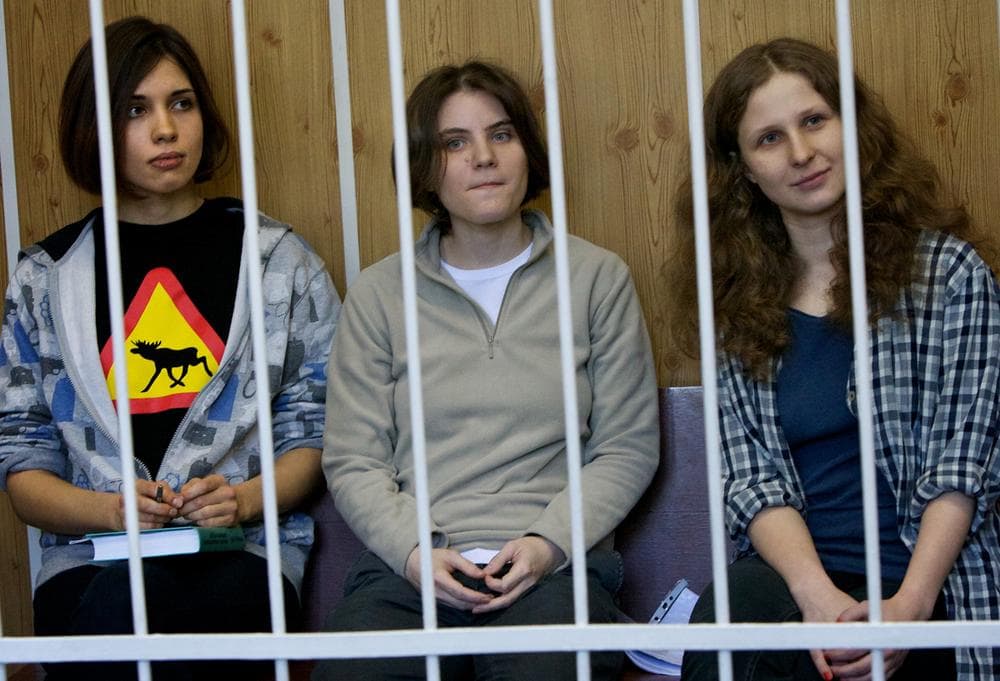Advertisement
Freedom Of Speech? Nyet

A political trial opened in Moscow on Monday where three young women – Yekaterina Samutsevich, Maria Alyokhina, and Nadezhda Tolokonnikova – members of the provocatively named punk rock group Pussy Riot, were charged with “hooliganism under religious motives.” Last February, the group performed a crude anti-Putin song on the altar of the Cathedral of Christ the Savior, an act that led to their immediate arrest and the charges. If convicted, they could face up to seven years in jail.
Such cases are hardly new in Russia’s history. But we are living in a post-Soviet world, where the government has come to power after a (supposedly) fair and competitive election and freedom of print and speech are (supposedly) protected. A case like this exposes the hypocrisy that adorns such democratic pretensions.
The Soviet regime had a more straightforward way of dealing with such audacity. In the late 1950s and early 1960s two Soviet writers, Yuli Daniel and Andrei Sinyavsky, challenged the government’s monopoly on what could be published by sending their essays and short stories to the West, where their writings appeared under pseudonyms. Back then, their themes were startling rebukes to official ways of looking at the world.
One of Daniel’s short stories, “This is Moscow Speaking,” described an imaginary Public Murder Day, when the government urges citizens to kill one another. The prosecutor insisted that the story maligned the reality of Soviet life. But Daniel pointed out in his defense that far worse things had gone on under Stalin: “Mass purges and the deportation and annihilation of entire peoples. What I wrote was child’s play by comparison.” A second story, “The Man from Minap,” revolved around a single comic idea: that the hero is able to predetermine the gender of his children by thinking during intercourse either of Karl Marx if he wishes a boy or of Klara Zetkin (a founder of the German communist party) if he prefers a girl. Needless to say, Daniel’s clever story lines did not appeal to the court’s sense of humor.
Meanwhile, the literary critic Andrei Sinyavsky criticized the regime’s official doctrine of “Socialist Realism,” insisting that “literature should “teach us how to be truthful with the aid of the absurd and the fantastic.” And in his short story “The Trial Begins,” Sinyavsky depicted a loathsome set of characters, including an anti-Semitic prosecutor and a cynical lawyer who are connected to Stalin’s false accusations against Jewish doctors in January 1953. The prosecution accused Sinyavsky of harboring the views of his characters. Convicted along with Daniel of “anti-Soviet agitation and propaganda” – the useful catchall provision of the criminal code – Sinyavsky was sent to the labor camps for seven years; Daniel received “only” five years in the camps because he was a wounded veteran of World War II.
Years later, the judge at their trial, Lev Smirnov, discussed the case with a visiting Harvard Law School professor. Smirnov claimed that the writers had committed “blasphemy.” But when asked where the word “blasphemy” appeared in the Soviet criminal code, he had no reply.
Sadly, the young women of Pussy Riot appear vulnerable to a similar mindset. Article 70, which prohibited “anti-Soviet agitation and propaganda,” no longer exists. But today’s Russian Orthodox Church has strong ties to Putin’s government and does not appear amenable to separating the young women’s act of defiance inside a cathedral from the legal guarantees of freedom of expression that are supposed to apply everywhere.
Ten “victims” have come forth to describe the “moral damages” they endured in church that day. In their testimony, the band members have expressed an apology for any offense their performance may have caused believers, a concession they offered with the hope of bringing their prosecution to an end. They have been detained since that fateful day in February, three twenty-somethings facing a further seven years in jail for performing a song critical of Vladimir Putin.
Blasphemy is usually thought of as an impious or irreverent act directed against God or a sacred or inviolable institution or person. It only takes a sense of humor to deflect such an accusation. In their day, Soviet prosecutors were immune to such appeals. Today’s Russia seems bent on adopting a similar intolerance. Plus ça change, plus c’est la mȇme chose.
This program aired on August 1, 2012. The audio for this program is not available.